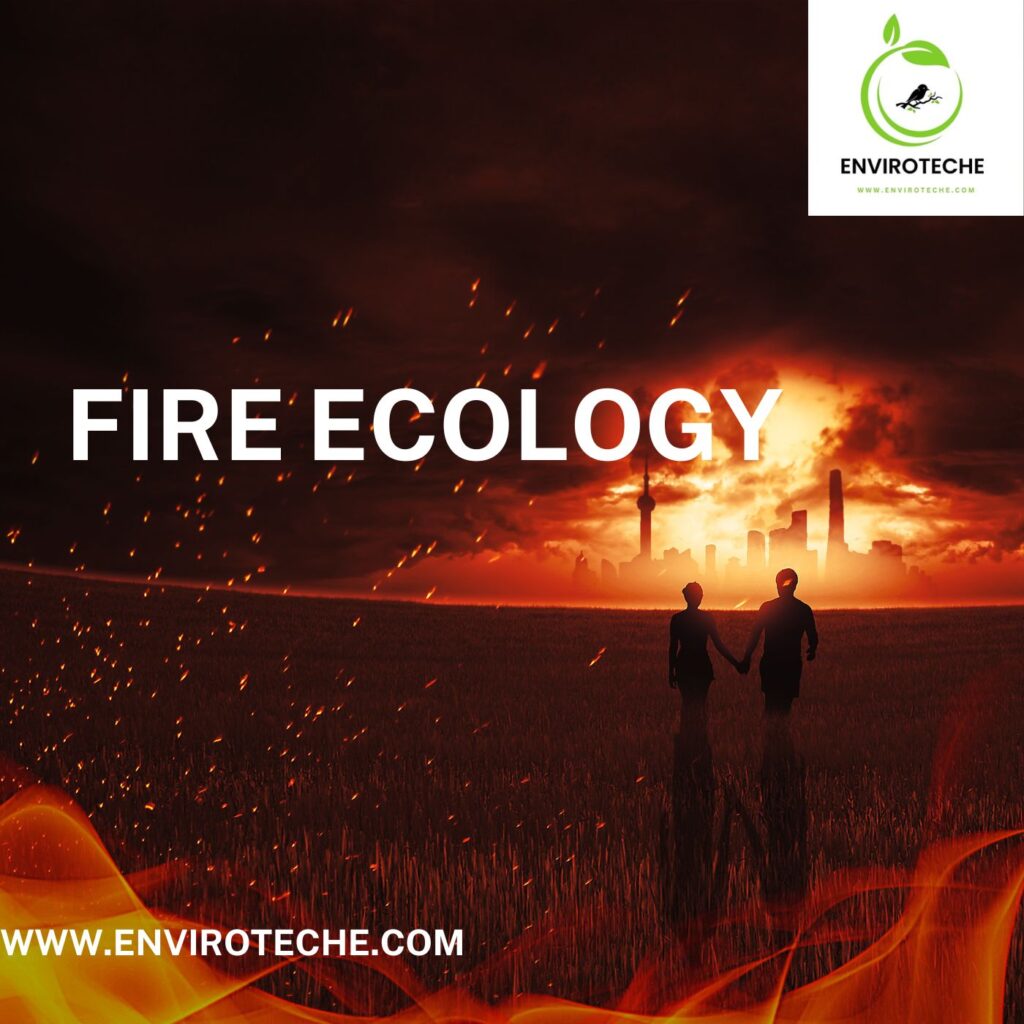Table of Contents

What is fire Ecology?
Fire ecology is a scientific discipline that studies the relationship between fire and the environment. It seeks to understand the ecological role of fire, its effects on different landscapes, and how different species have adapted to fire over evolutionary time scales.
Wild land Fire brings great destruction to the home of many animals, birds and the woods. It also causes serious health issues to human. It causes many environmental problems (such as emission of CO2, which is a greenhouse gas, disturbance of soil nature, lack of wood, etc.)
During prehistoric time, wildfire were a natural occurrence long before human civilization. Lightning strikes and volcanic eruption were the primary cause of the prehistoric wild fire. These natural wildfire helped in the renewal of the ecosystem, clear out dead vegetation.
Human-Fire Interaction with Fire Ecology:
As human society evolved, they began to use fire for various purposes including hunting, cooking, and clearing land for agriculture. But Later, throughout history, large and devastating fire have been recorded. One notable example in history is Great Fire of Rome in 64 AD, which destroyed a significant portion of the city.
Fire has typically been thought of as an issue in temperate and boreal ecosystem. Every year, the tropics experience more fire than anywhere else on Earth. As tropics cover one-third of the land surface of the planet, comprising over 40% of all the forest, over 35% of all people, and the vast majority of all the species.
In 2017, wildfires consumed approximately 4 million hectares land. In 2018, the “Camp Fire” in California destroyed nearly 20,000 structures and claimed the lives of more than 80 people, with insured losses exceeding $10 billion.
The Latest fire in 2023 is Donnie Creek Fire in which a 25 years old firefighter died. According to police, he was working in a remote area about 150 km north to Fort St. John. The Donnie Creek Fire is the largest ever recorded in B.C. history. It has burnt more than 5715 square kilometers of forest as of July 2, 2023. According to B.C. Wildfire Service, it was due to lightning spark.
Causes of Fire Ecology:
Fire may be natural and anthropogenic. Natural causes include lightning strikes especially in dry areas. Anthropogenic causes include human actions such as campfires left behinds, discarded cigarettes, burning debris, intentional acts of arson. Hot and dry weather conditions increases the wild fire. Malfunctioning power and electrical equipment sparks may also cause ignition which results in wildfire. Improper use of wildfire can also cause fire. Unintentional fires may also result in huge fires.
Fire Ecology Impact on Climate:
Fires can significantly impact climate change. When large wildfires occur, they release massive amount of carbon dioxide and other greenhouse gases into the atmosphere.This contributes to the greenhouse effect, trapping heat and leading to global warming. Additionally, burning forests reduce the Earth’s ability to absorb carbon dioxide as trees play a significant role in the carbon sequestration.
Health Issues due Fire Ecology:
The wildfire creates direct and indirect impacts on human health. If the fire kill the residents of that area, we can say that it is a direct impact. For example, 70 firefighters were killed in suppression operations in Mexico in 1998. Despite this, fire releases dangerous substances and particulates such as carbon monoxide which bounds to the hemoglobin of the blood cell and causes suffocation and results in death of the victims. This is the negative indirect effect of the fire. Yet the influenced proportion is variable and unknown but we see the adverse effects on human health is greatly increasing.
Particulate matter ranging from size 2.5-10 microns are dangerous as they can be inhaled from air and as they are solid particles so they injure the inner organs creating severe respiratory and cardiovascular problems in all stages of life.
Environmental impacts of Fire Ecology:
Environmental impacts range from local to global in scale. Locally, fire burns the shoot and also effects the roots of the plants due to which the water retaining capacity greatly reduced and it will causes soil erosion which results in the destruction of soil and reduced greenery and no crop production for at least coming few years, even low intensity fire often kill a large proportion of canopy as in tropical evergreen forest, low moving animals experience the great impact of such fires as due to smoke and flames they can be dead.
Fire can also create large regional or global level climate change. Such as the fire occurring every year in Amazon forests results in the production of huge amount of CO2, destruction of land where the animals live, habitat loss.
Economic Impacts of Fire Ecology:
Wildfires can have severe economic consequences, including damage to infrastructure, increased firefighting expenditures. Popular tourism points may suffer from wildfires leading to decreased number of visitors and revenue loss. Due to the adverse effects of wildfire on human, the medical health cost also needed to be increased.
Wildfires can also disrupt the means of transportation network. Farmers face intense poverty because the crops are the only means of their income when crops are burnt, their income is also gone and their social level falls behind.
Ecological benefits of Fire Ecology:
Prescribed flames are small level fire which is flamed by humans for many purposes. While the wild fires are large scale unattended fires which can have greater level of threats. Planned or controlled burning are carried out under strict safety guidelines after careful planning.
Periodic fires are beneficial for many ecosystems. For instance, as decaying or deceased plants accumulate on the surface, they may inhibit soil-dwelling species from absorbing nutrients or obstruct land animals from getting to the soil. Additionally, the layer of decaying organic waste could impede the establishment of new or smaller plants. The purpose of a controlled prescribed burn by humans is to eliminate that layer of rot, enabling the other, healthy components of the ecosystem to flourish. This is how fire promotes soil fertility, a benefit that farmers have been utilizing for generations.
Role of Fire in Savanna:
African Savanna experiences many changes due to the dry season fire as the fire burn the large trees and plants and keep it as plains. Fires like in Conifer Forest in USA do not destruct the habitat of the ecosystem. Additionally, these fires kill the heighted tees and maintain a low tree cover and restricts forest to spread on the grassland. The expansion of the savanna into the forest is halted when there is a dense canopy of trees, as in a forest.
Role of Fire in Europe:
Controlled burning has been used for centuries to clear vegetation, maintain grassland and improving soil fertility. Some tree species in Europe depends on the fire to open their cones and release seeds.
Adaptations and controlling measures:
Effective strategies and mitigation strategies are crucial for minimizing the impacts of wildfires on communities. Promoting awareness of fire safety measures can help prevent accidental wildfires. Implementing advanced fire detecting systems enables early identification of wildfires. Early detection allow for quicker response times, which can help contain fires before they spread extensively.
Implementing fuel management strategies involves thinning vegetation, removing dead trees and debris and creating firebreaks to reduce the availability of fuel for wildfires.
Ensuring sufficient firefighting resources is essential for effective response to wildfires. Ensuring communities to develop emergency plans, establish evacuation routes, and conduct drills can enhance their preparedness for wildfire events.
Authors detail:
1Eram Shahzad, 1Manahil Saleem, 1Waqar-un-Nisa
1Department of Environmental Sciences, Government College University Faisalabad
Check Other Schlorships:
- FREE Earth-inspired courses
- The Graduate Application Portal for King Fahd University, Saudi Arabia is open.
- International Excellence Scholarship 2023-24
- Scholarship in USA
Fire EcologyFire EcologyFire EcologyFire EcologyFire Ecology
